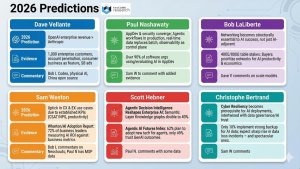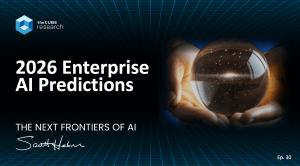In my coverage of the second annual Cisco AI Readiness Index report, we see a shifting AI landscape: a dramatic rise in production workloads. Our research shows similar results, with 18% to 54% increase in AI in production workloads in just nine months, making organizations jump into an AI arms race. The report indicates a surge in adoption is outpacing infrastructure readiness, leaving many leaders grappling with urgency and uncertainty.
With 98% feeling heightened pressure to deliver on AI and 85% believing they have less than 18 months to act, the stakes have never been higher. Despite this, only 21% of companies report having sufficient GPU capacity for current and future AI workloads, and a mere 13% consider themselves fully prepared to harness AI’s transformative potential—an alarming dip from last year. These findings underscore a critical imbalance: while AI ambition soars, infrastructure struggles to keep pace, threatening to stall innovation just as it’s gaining momentum.
Read the full Cisco report here.
Read more on the press release here.
How the Cisco AI Readiness Index Redefines Application Development
The Cisco AI Readiness Index provides an in-depth evaluation of how prepared organizations are to leverage artificial intelligence effectively. With data derived from a global survey of over 8,000 business leaders, the Index categorizes companies into four readiness groups—Pacesetters, Chasers, Followers, and Laggards—based on their maturity across six dimensions: strategy, infrastructure, data, governance, talent, and culture. The findings highlight a significant gap between AI ambitions and practical capabilities: 86% of organizations aren’t fully prepared to maximize AI’s potential, despite 97% acknowledging a growing urgency to adopt AI-driven solutions.
Impacts on Application Development
As artificial intelligence transforms the technological landscape, application development must evolve to meet new demands and opportunities, with critical focus areas identified by the Cisco AI Readiness Index. First, infrastructure readiness and scalability emerge as non-negotiable; AI workloads require robust, secure, and adaptable systems that handle immense compute and data processing needs. This underscores the importance of dismantling data silos and implementing centralized governance to enable developers to build seamless, intelligent applications.
Equally transformative is integrating AI and AIOps, as predictive analytics, self-healing systems, and intelligent automation redefine development pipelines, pushing developers to balance innovative AI features with operational reliability. Meanwhile, the focus on talent and up-skilling reflects the ongoing challenges in bridging expertise gaps, compelling organizations to invest in training for advanced AI applications, including machine learning and natural language processing. In parallel, ethical AI and governance demand developers create responsible, transparent, and privacy-compliant solutions, requiring cross-disciplinary collaboration.
Lastly, industry-specific opportunities highlight the nuanced ways AI readiness shapes sectors like retail and healthcare, offering developers avenues to tailor applications that address distinct challenges and unlock competitive advantages. These interconnected themes chart the roadmap for innovation in application development amidst an AI-driven future.
Here are the focus points to consider:
Forward-Looking
1. Infrastructure Readiness and Scalability – Robust and scalable infrastructure is critical for application development in AI-driven environments. As AI workloads demand intensive computing and data management, development teams need access to agile, secure, and optimized platforms. The emphasis on dismantling data silos and centralizing data governance is particularly relevant for application developers aiming to create seamless and intelligent applications.
2. Integration of AI and AIOps – The Index and supporting discussions underscore the growing role of AI in automating IT operations (AIOps). This trend reshapes application development by directly integrating predictive analytics, self-healing systems, and intelligent automation into development pipelines. Developers must now build solutions that leverage these AI capabilities while ensuring performance and reliability.
3. Focus on Talent and Up-skilling – Skill gaps and talent shortages, particularly in AI and data science expertise, present challenges for application development. The report stresses the need for ongoing education and up-skilling to bridge this gap, enabling developers to effectively incorporate advanced AI features, such as machine learning models and natural language processing, into their applications.
4. Ethical AI and Governance – Application developers are increasingly expected to address ethical considerations in AI. This includes adhering to privacy standards, ensuring unbiased algorithms, and creating transparent user experiences. These demands require deeper collaboration between development, legal, and governance teams to design compliant and responsible applications.
5. Industry-Specific Opportunities – The Index identifies varying readiness levels across industries, such as retail and healthcare, each presenting unique challenges and opportunities. Application developers can tailor their AI strategies to align with industry-specific needs, from personalized customer experiences to advanced diagnostics in healthcare.
In the evolving AI-driven landscape, application development is being reshaped by the need for scalable infrastructure, AI-driven automation (AIOps) integration, a focus on up-skilling talent, adherence to ethical AI practices, and industry-specific adaptations. The Cisco AI Readiness Index highlights these priorities, emphasizing how developers must align technical capabilities with strategic intent to overcome barriers and seize opportunities across sectors. By addressing these interconnected challenges, organizations can accelerate their AI adoption journey and foster innovation in application development that is both impactful and future-ready.
The Cisco AI Readiness Index provides comprehensive insights that are essential for application developers aiming to integrate artificial intelligence effectively into their workflows. This index highlights several key factors critical to successful AI adoption, including the necessity for adaptable strategies that can evolve with technological advancements and shifting market demands. It emphasizes the importance of fostering cross-functional collaboration, which brings together diverse expertise from various fields within an organization, thereby enhancing the overall capabilities of AI initiatives.
The Index advocates for proactive investments in scalable infrastructure, which is fundamental for supporting the increased data processing and computational needs that arise with AI deployment. It also stresses the importance of up-skilling, underscoring the need for developers to continually enhance their knowledge and skills to stay abreast of rapidly changing AI technologies and methodologies.
For developers, this serves as a call to innovate by ensuring that technical solutions are closely aligned with their organizations’ overarching goals. By doing so, developers can create applications that not only possess robust functionalities but also deliver significant strategic value. As the adoption of AI continues to accelerate across industries, developers have a unique opportunity to spearhead the transformation of innovative concepts into intelligent, high-performing applications that can drive their organizations forward in an increasingly competitive landscape.
This is just the beginning. Let’s connect and talk more on how AI-readiness impacts your organizations application development and modernization initiatives.



